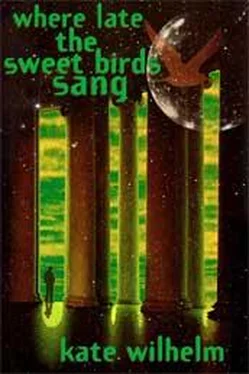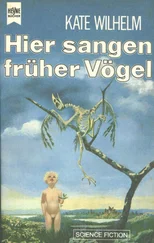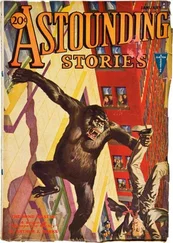They took him to the cave entrance, which was just over a hundred yards from the hospital. Inside the cave they used lanterns. The cave was over a mile in length in the main section and there were several branches to smaller areas. Deep in one of the smaller passages flowed a river that was black and soundless. Spring water, good water. Vlasic nodded again and again. When they finished the cave tour he was still nodding. “It’s good,” he said. “It’ll work. The laboratories go in there, underground passage from the hospital, safe from contamination. Good.”
They worked sixteen hours a day that summer and into the fall. In October the first wave of flu swept the country, worse than the outbreak of 1917-1918. In November a new illness appeared, and here and there it was whispered that it was plague, but the government Bureau of Information said it was flu. Grandfather Sumner died in November. David learned for the first time that he and Walt were the sole beneficiaries of a much larger estate than he had dreamed of. And the estate was in cash. Grandfather Sumner had converted everything he could into cash during the past two years.
In December the members of the family began to arrive, leaving the towns and villages and cities scattered throughout the valley to take up residence in the hospital and staff buildings. Rationing, black markets, inflation, and looting had turned the cities into battle mounds. And the government was freezing all assets of every business — nothing could be bought or sold without approval. The army was occupying the buildings, and government employees were overseeing the strict rationing that had been imposed.
The family brought their stocks with them. Jeremy Streit brought his hardware merchandise in four truckloads. Eddie Beauchamp brought his dental equipment. David’s father brought all that he could from his department store. The family had diversified, and there were representative supplies from almost every conceivable area of business and professional endeavor.
With the failure of radio and television communication, there was no way for the government to cope with the rising panic. Martial law was declared on December 28. Six months too late.
There was no child left under eight years of age when the spring rains came, and the original 319 people who had come to the upper valley had dwindled to 201. In the cities the toll had been much higher.
David studied the fetal pig he was getting ready to dissect. It was wrinkled and desiccated, its bones too soft, its lymph glands lumpy, hard. Why? Why did the fourth generation decline? Harry Vlasic came to watch briefly, then walked away, his head bowed in thought. Not even he could come up with any answers, David thought, almost with satisfaction.
That night David, Walt, and Vlasic met and went over it all again. They had enough livestock to feed the two hundred people for a long time, through cloning and sexual breeding of the third generation. They could clone up to four hundred animals at a time. Chickens, swine, cattle. But if the livestock all became sterile, as seemed indicated, then the food supply was limited.
Watching the two older men, David knew that they were purposely skirting the other question. If the people also became sterile, how long would they need a continuing supply of food? He said, “We should isolate a strain of sterile mice, clone them, and test for the reemergence of fertility with each new generation of clones.”
Vlasic frowned and shook his head. “If we had a dozen undergraduate students, perhaps,” he said drily.
“We have to know,” David said, feeling hot suddenly. “You’re both acting like this is just a five-year emergency plan to tide us over a bad few years. What if it isn’t that at all? Whatever is causing the sterility is present in all the animals. We have to know.”
Walt looked at David briefly and said, “We don’t have the time or the facilities to do any research like that.”
“That’s a lie,” David said flatly. “We can generate all the electricity we can use, more than enough power. We have equipment we haven’t even unloaded yet. . . .”
“Because there’s no one who can use it yet,” Walt said patiently.
“I can. I’ll do it in my free time.”
“What free time?”
“I’ll find it.” He stared at Walt until his uncle shrugged permission.
In June, David had his preliminary answers. “The A-four strain,” he said, “has twenty-five percent potency.” Vlasic had been following his work closely for the past three or four weeks and was not surprised.
Walt stared at him in disbelief. “Are you sure?” he whispered after a moment.
“The fourth generation of cloned sterile mice showed the same degeneracy that all clones show by then,” David said wearily. “But they also had a twenty-five percent fertility factor. The offspring have shorter lives, but more fertile members. This trend continues to the sixth generation, where fertility is up to ninety-four percent and life expectancy starts to climb again, and then it’s on its way to normalcy steadily.” He had it all on the charts that Walt now studied. A, A 1, A 2, A 3, A 4, and their offspring by sexual reproduction, a, a 1, a 2. . . There were no clone strains after A 4; none had survived to maturity.
David leaned back and closed his eyes and thought about bed and a blanket up around his neck and black, black sleep. “Higher organisms must reproduce sexually or die out, and the ability to do so is there. Something remembers and heals itself,” he said dreamily.
“You’ll be a great man when you publish,” Vlasic said, his hand on David’s shoulder. He then moved to sit next to Walt, to point out some of the details that Walt might miss. “A marvelous piece of work,” he said softly, his eyes glowing as he looked over the pages. “Marvelous.” Then he glanced back at David. “Of course, you are aware of the other implications of your work.”
David opened his eyes and met Vlasic's gaze. He nodded. Puzzled, Walt looked from one to the other of them. David got up and stretched. “I have to sleep,” he said.
But it was a long time before he slept. He had a single room at the hospital, more fortunate than most, who were sleeping doubled up. The hospital had more than two hundred beds, but few single rooms. The implications, he mused. He had been aware of them from the start, although he had not admitted it even to himself then, and was not ready to discuss it now. They weren’t certain yet. Three of the women were pregnant finally, after a year and a half of barrenness. Margaret was near term, the baby well and kicking at the moment. Five more weeks, he thought. Five more weeks, and perhaps he never would have to discuss the implications of his work.
But Margaret didn’t wait five weeks. In two weeks she delivered a stillborn child. Zelda had a miscarriage the following week, and in the next week May lost her child. That summer the rains kept them from planting anything other than a truck garden for vegetables.
Walt began testing the men for fertility, and reported to David and Vlasic that no man in the valley was fertile.
“So,” Vlasic said softly, “we now see the significance of David’s work.”
Winter came early in sheets of icy rain that went on day after day after day. The work in the laboratories increased, and David found himself blessing his grandfather for his purchase of Selnick’s equipment, which had come with detailed instructions for making artificial placentas as well as nearly completed work on computer programs for synthetic amniotic fluids. When David had gone to talk to Selnick about the equipment, Selnick had insisted — madly, David had thought at the time — that he take everything or nothing. “You’ll see,” he had said wildly. “You’ll see.” The following week he had hanged himself, and the equipment was on its way to the Virginia valley.
Читать дальше












